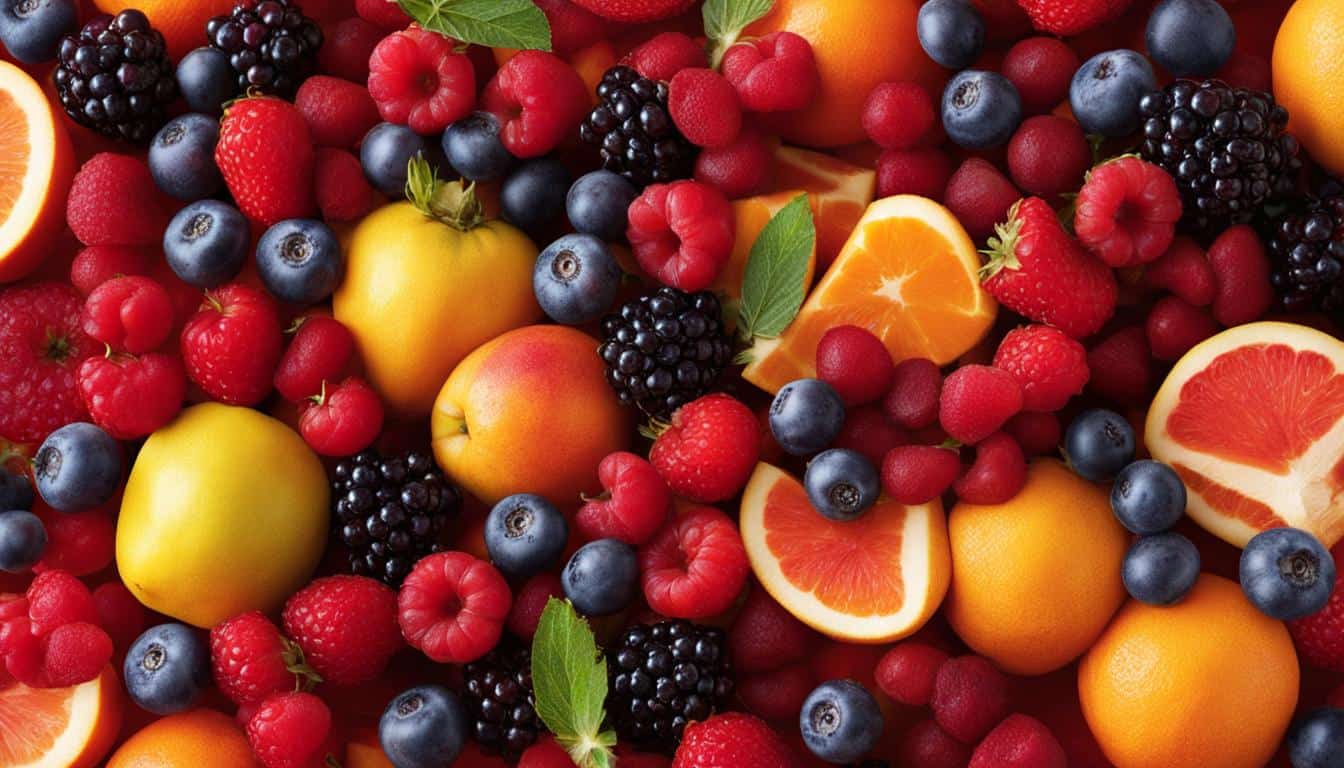When experiencing a cough or cold, it’s important to be mindful of the fruits you consume. Some fruits can worsen cough and cold symptoms, making it crucial to know which ones to avoid. In this guide, we will explore the fruits that are best to steer clear of during cough and cold, and why they should be avoided.
Key Takeaways:
- Some fruits can worsen symptoms during cough and cold.
- Avoid citrus fruits as they can cause acid reflux and throat irritation.
- Refrigerated fruits may exacerbate cough and cold symptoms, so it’s best to avoid them.
- Being mindful of the fruits you consume can support your body’s recovery during cough and cold.
Fruits to Eat During Cough and Cold
When facing a cough and cold, incorporating the right fruits into your diet can help support your immune system and aid in the recovery process. These fruits provide essential nutrients and vitamins that can help alleviate symptoms and promote overall well-being. Let’s explore some of the best fruits to consume during cough and cold.
Lemons: A Powerful Source of Vitamin C
Lemons are known for their high vitamin C content, which plays a vital role in supporting the immune system. Vitamin C helps protect the body against cough and cold infections and aids in the production of collagen, which promotes tissue repair. Start your day with a glass of lemon water mixed with honey for a refreshing and immune-boosting beverage.
Pineapples: Mucolytic Properties for Cough and Cold Relief
Pineapples contain bromelain, an enzyme with potent anti-inflammatory properties. Bromelain can help break down mucus and alleviate congestion, making it beneficial for cough and cold relief. Enjoying fresh pineapple or incorporating it into smoothies can provide much-needed relief from cough and cold symptoms.
Pomegranate: Antioxidant Powerhouse for Cough and Cold Prevention
Pomegranates are rich in antioxidants, particularly flavonoids, which help inhibit the growth of viruses in the body. Daily consumption of pomegranate juice has been shown to decrease the duration of cough and colds. Additionally, pomegranates possess anti-inflammatory and antibacterial properties, making them an excellent choice for cough and cold prevention.
Bananas: Soothing and Nutrient-Rich for Cough and Cold Symptoms
Bananas are easily digestible and provide essential nutrients such as potassium and vitamin B6. They are often included in the BRAT diet (banana, rice, applesauce, and toast), which is commonly recommended for individuals with cough and cold. Bananas can help soothe the throat and reduce symptoms such as vomiting and nausea.
| Fruit | Benefits |
|---|---|
| Lemons | Rich in vitamin C for immune support and tissue repair |
| Pineapples | Contain bromelain for mucus breakdown and congestion relief |
| Pomegranate | Packed with antioxidants for cough and cold prevention |
| Bananas | Soothing and nutrient-rich for cough and cold symptoms |
By incorporating these fruits into your diet, you can provide your body with the necessary nutrients and support its recovery during cough and cold. Remember to consult with a healthcare professional for personalized advice and guidance.
Lemons: A Powerful Source of Vitamin C
Lemons are renowned for their high vitamin C content, making them a valuable fruit to consume during cough and cold. Vitamin C is an essential nutrient that plays a crucial role in supporting the immune system and protecting the body against infections. Consuming lemon juice mixed with lukewarm water and honey is a popular remedy for its immune-boosting properties and soothing effects on the throat.
Not only does vitamin C help strengthen the immune system, but it also aids in DNA repair and promotes serotonin production, which can improve mood and reduce stress. This makes lemons an excellent fruit to include in your diet when battling cough and cold symptoms.
“Lemons are a great source of vitamin C, which is known for its immune-boosting properties. Incorporating lemons into your diet during cough and cold can help support your body’s natural defenses and aid in the recovery process.” – Dr. Emily Thompson, Nutrition Expert
Additionally, lemons have a refreshing taste that can help alleviate the discomfort associated with a sore throat. Their tangy flavor can also stimulate saliva production, aiding in the relief of dryness and irritation in the throat. Whether consumed as a warm beverage or used to enhance the flavor of other dishes, lemons offer a powerful combination of health benefits and culinary versatility.
“The vitamin C in lemons can support the immune system and contribute to the body’s defense against cough and cold. Incorporating lemon juice into your routine can be a delightful way to boost your health and enhance the taste of your meals during illness.” – Dr. Sarah Reynolds, Naturopathic Physician
Pineapples: Mucolytic Properties for Cough and Cold Relief
Pineapples are a delicious and tropical fruit that not only adds a burst of flavor to your meals but also offers numerous health benefits, especially when it comes to cough and cold relief. This juicy fruit contains an enzyme called bromelain, which has potent mucolytic properties. Mucolytics help break down and thin the mucus in the respiratory system, making it easier to expel and providing relief from congestion.
In addition to its mucolytic properties, bromelain also possesses anti-inflammatory properties. This can help reduce inflammation in the airways, which is often a common symptom of cough and cold. By reducing inflammation, pineapples can alleviate discomfort and promote easier breathing.
To incorporate pineapples into your diet during a cough or cold, you can enjoy them fresh as a snack, add them to smoothies, or use them in savory dishes. The natural sweetness of pineapples makes them a versatile and tasty ingredient that can enhance the flavor of various recipes.

Benefits of Pineapples for Cough and Cold Relief:
- Contains bromelain, a mucolytic enzyme that helps break down mucus in the respiratory system.
- Has anti-inflammatory properties that reduce inflammation in the airways.
- Provides relief from congestion and promotes easier breathing.
- Can be enjoyed fresh, added to smoothies, or used in savory dishes to enhance flavor.
How to Incorporate Pineapples into Your Diet:
- Enjoy fresh pineapple as a healthy snack.
- Add pineapple chunks to your favorite smoothie recipes.
- Include pineapple in fruit salads for a refreshing twist.
- Grill pineapple slices for a sweet and tangy addition to grilled meats or salads.
Table: Nutritional Information of Pineapples (Per 100g)
| Nutrient | Amount |
|---|---|
| Calories | 50 |
| Carbohydrates | 13g |
| Fiber | 1.4g |
| Vitamin C | 79.1mg |
| Manganese | 0.9mg |
| Bromelain | 46.1mg |
Pomegranate: Antioxidant Powerhouse for Cough and Cold Prevention
Pomegranate is a vibrant and nutritious fruit that offers numerous health benefits, including its ability to support the immune system during cough and cold episodes. It is a rich source of antioxidants, particularly flavonoids, which play a crucial role in preventing and fighting off infections.
Flavonoids in pomegranate have been found to inhibit the growth of viruses in the body, thereby reducing the duration of cough and cold by up to 40%. These powerful antioxidants also have anti-inflammatory and antibacterial properties, further supporting the body’s recovery process. By incorporating pomegranate into your diet, you can strengthen your immune system and potentially minimize the severity of cough and cold symptoms.
To fully enjoy the benefits of pomegranate, consider adding it to your daily routine in various forms. Fresh pomegranate seeds can easily be added to salads, smoothies, or enjoyed on their own. Additionally, pomegranate juice can be a convenient and delicious way to consume this antioxidant-rich fruit. Just make sure to choose 100% pure pomegranate juice without added sugars or artificial additives.
Pomegranate Nutritional Information
| Nutrient | Amount per 100g |
|---|---|
| Calories | 83 |
| Carbohydrates | 18.7g |
| Fiber | 4g |
| Protein | 1.7g |
| Fat | 1.2g |
| Vitamin C | 10.2mg |
| Vitamin K | 16.4mcg |
| Potassium | 236mg |
With its impressive nutritional profile and immune-boosting properties, pomegranate is a fruit worth considering during cough and cold episodes. However, it’s important to remember that no single fruit can magically cure a cough or cold. It’s always advisable to consult with a healthcare professional for proper diagnosis and treatment.
Bananas: Soothing and Nutrient-Rich for Cough and Cold Symptoms
When it comes to finding relief from cough and cold symptoms, bananas are a highly recommended fruit. Not only are they easy to digest, but they also provide a range of nutrients that can support your body’s recovery. Whether you’re experiencing a scratchy throat or feeling nauseous, bananas have properties that can help alleviate these discomforts.
Bananas are particularly beneficial for individuals following the BRAT (banana, rice, applesauce, and toast) diet, which is often recommended for those with cough and cold. This diet consists of easily digestible foods that can help soothe the digestive system during illness. Bananas are gentle on the stomach and can provide a good source of energy, making them an ideal choice for individuals feeling weak or fatigued.
Additionally, bananas are rich in potassium, vitamin C, and vitamin B6, which are all essential for supporting the immune system. These nutrients can help strengthen your body’s defense against cough and cold infections, aiding in a faster recovery. So, next time you’re feeling under the weather, reach for a banana to help soothe your symptoms and promote healing.

Table: Nutritional Content of Bananas
| Nutrient | Amount per 100g |
|---|---|
| Calories | 96 |
| Carbohydrates | 24g |
| Potassium | 358mg |
| Vitamin C | 8.7mg |
| Vitamin B6 | 0.4mg |
Source: USDA National Nutrient Database
Kiwi: Boosting White Blood Cell Activity for Cough and Cold Prevention
Kiwis are a lesser-known fruit that offers significant benefits during cough and cold. They are rich in micronutrients that enhance the movement of white blood cells in the bloodstream. This boosts the body’s defense against cough and cold infections and reduces sore throat symptoms.
One medium-sized kiwi contains approximately 64 milligrams of vitamin C, which is more than enough to meet your daily requirement. Vitamin C is a powerful antioxidant that helps strengthen the immune system and fight off infections. It also aids in the production of white blood cells, which play a crucial role in defending the body against pathogens.
In addition to vitamin C, kiwis are also a great source of other essential micronutrients such as vitamin K, vitamin E, potassium, and fiber. These nutrients further support the body’s overall health and contribute to its ability to combat cough and cold infections.
| Nutrient | Amount per 100g |
|---|---|
| Vitamin C | 93mg |
| Vitamin K | 41.4µg |
| Vitamin E | 1.46mg |
| Potassium | 312mg |
| Fiber | 3g |
To incorporate kiwis into your diet during cough and cold, you can enjoy them on their own, add them to smoothies, or use them as a topping for salads and desserts. Their unique, sweet-tart flavor adds a refreshing twist to any dish.
It’s important to note that while kiwis are generally safe to consume, some individuals may be allergic to them. If you experience any adverse reactions after eating kiwis, such as itching, swelling, or difficulty breathing, it’s best to seek medical advice.

Other Beneficial Fruits for Cough and Cold
Aside from lemons, pineapples, pomegranates, bananas, and kiwis, there are several other fruits that can provide relief and support during cough and cold. These fruits include strawberries, watermelon, blueberries, and apples. Each of these fruits offers unique nutritional benefits that can help alleviate symptoms and promote a faster recovery.
Strawberries are packed with vitamin C and antioxidants, which can strengthen the immune system and reduce inflammation. Watermelon is not only refreshing but also hydrating, helping to soothe a sore throat. It is also a good source of vitamins A and C. Blueberries are rich in antioxidants, vitamins, and minerals, which can boost immunity and fight off infections. Apples, with their fiber content, can help soothe coughs and improve digestion.
These fruits can be consumed in various ways. They can be eaten fresh, added to smoothies or salads, or even juiced. Incorporating a variety of these fruits into your diet during cough and cold can provide your body with essential nutrients and antioxidants, supporting your immune system and aiding in a faster recovery.
| Fruit | Nutritional Benefits |
|---|---|
| Strawberries | Vitamin C, antioxidants |
| Watermelon | Vitamins A and C, hydration |
| Blueberries | Antioxidants, vitamins, minerals |
| Apples | Fiber, soothing properties |
Conclusion
While it’s important to consume the right fruits during cough and cold, it’s equally crucial to be aware of the fruits to avoid. Certain fruits can worsen symptoms and prolong the recovery process. Citrus fruits, such as oranges and grapefruits, should be avoided as they can cause acid reflux and throat irritation, exacerbating cough and cold symptoms. Additionally, refrigerated fruits should be avoided as they may further irritate the throat and increase discomfort. By making smart choices and avoiding these fruits, we can support our body’s recovery and alleviate cough and cold symptoms.
On the other hand, there are several fruits that can provide relief and aid in recovery during a cough and cold. Fruits like lemons, pineapples, pomegranates, bananas, kiwis, strawberries, watermelon, blueberries, and apples offer various nutrients, antioxidants, and immune-boosting properties that can help alleviate symptoms and support the body’s natural defenses. By including these fruits in our diet, we can give our body the necessary tools to fight off infections and recover faster.
Remember, when dealing with a cough and cold, it’s not just about what you eat, but also what you avoid. By being mindful of the fruits you consume, you can ensure you’re giving your body the best chance to heal. So, next time you reach for a fruit, make sure it’s one that supports your recovery and helps you on your way to feeling better.
FAQ
Can I eat any fruits when I have a cough or cold?
Yes, there are certain fruits that can be beneficial during cough and cold and help support your recovery. However, it’s important to avoid certain fruits that may worsen your symptoms.
Which fruits should I avoid during cough and cold?
You should avoid citrus fruits, as they can cause acid reflux and throat irritation. Refrigerated fruits should also be avoided, as they may exacerbate your condition.
What fruits should I eat during cough and cold?
There are several fruits that can be consumed during cough and cold and provide benefits. Lemons, pineapples, pomegranates, bananas, kiwis, strawberries, watermelon, blueberries, and apples are all good choices.
How does consuming lemons help during cough and cold?
Lemons are rich in vitamin C, which helps protect the body against cough and cold infections. They also aid in DNA repair and serotonin production, making them an excellent fruit to consume during cough and cold.
Why are pineapples beneficial for cough and cold relief?
Pineapples contain bromelain, an enzyme with potent anti-inflammatory properties. Bromelain can help break down mucus and alleviate congestion associated with cough and cold.
What makes pomegranate juice beneficial for cough and cold prevention?
Pomegranate juice is packed with antioxidants, particularly flavonoids, which inhibit the growth of viruses in the body. Daily intake of pomegranate juice can decrease the duration of cough and cold by 40%.
Why are bananas recommended during cough and cold?
Bananas are easy to digest and can help reduce symptoms such as vomiting and nausea. They provide essential nutrients and aid in the speedy recovery of the body.
How can kiwis boost white blood cell activity during cough and cold?
Kiwis are rich in micronutrients that enhance the movement of white blood cells in the bloodstream. This boosts the body’s defense against cough and cold infections and reduces sore throat symptoms.
Are there any other fruits that can help during cough and cold?
Yes, strawberries, watermelon, blueberries, and apples are additional fruits that provide various nutrients and antioxidants essential for overall health and immunity. These fruits can help alleviate symptoms and support the body’s recovery during cough and cold.





Leave a Reply